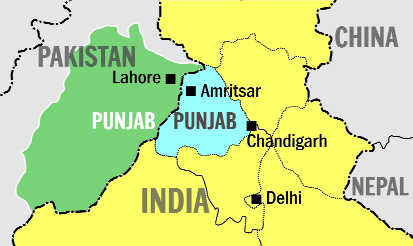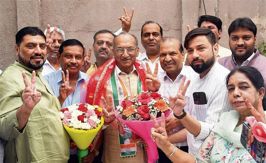
Punjabis on both sides of the border yearn for improved relations between India and Pakistan.
Ayesha Siddiqa
THE recent publication of an informal dialogue between two former spymasters, A S Dulat of India’s Research and Analysis Wing and Lieut-Gen Asad Durrani (retd) of Pakistan’s Inter-Services Intelligence in a book, The Spy Chronicles: RAW, ISI and the Illusion of Peace, has generated a lot of excitement. It was due to certain things they said that are not generally spoken about publicly by establishments but also for discussing the idea of peace between the two countries. This, in itself, is an issue, which tends to make policymakers nervous on both sides of the border.
One is not sure how sincerely the two men want peace despite the fact that they claimed that being in the business of war making had taught them about the need for regional stability. There was a longer discussion on Kashmir, which remains one of the most controversial subjects in the India-Pak relationship than building ties between the two Punjabs. This is a subject about which a lot of people had felt hopeful, especially since the mid-2000s until the terrorist attacks in Pathankot and Uri and India’s surgical strikes in Pakistan. Multilateral aid donors, like the World Bank, had even published observations and reports about the possible benefits to both sides of nurturing such an interaction.
Never before in the past 70 years, things had improved to the degree in the two Punjabs that many observers could think about this area as nodal point to bring a breakthrough in relations. In mid-2000 in India’s Punjab, the situation had improved from what it was earlier. In Pakistan, a lobby had started to develop that saw clear benefits in building links with the other side. Although Pakistan’s military establishment accused former Prime Minister Nawaz Sharif for being pro-Modi, it was the previous provincial government of Chaudhry Pervez Elahi that had started the initial dialogue process with his counterpart Capt Amarinder Singh. By the time Nawaz Sharif took over, he announced peace with India as part of his electoral agenda. The mind of the Punjabi entrepreneur had changed considerably regarding trade with India. Many entrepreneurs in Pakistan’s Punjab did not view Modi as a threat, which is contrary to what General Durrani claimed. According to the former ISI chief, Pakistanis believed India deserved the Modi government (as if it was a punishment!).
However, this opinion could not convert into a critical mass because while appreciating the significance of trade ties with India, the same people could not find a formula to detach themselves from their dependency on the military. The youth, the middle class and the upcoming upper-middle class in Punjab has grown on a narrative that gives a high place to the armed forces as compared to all other state institutions. But more than India, it is their own national security that is a sour point for these people. Thus, as Pakistan awaits its 2018 general elections, the establishment’s narrative of Sharif compromising on national security by reaching out to India is voiced to weaken the former prime minister. Nevertheless, this slogan would harm Nawaz Sharif only when compounded with a more domestic issue of the nature of power balance in the context of the country’s patronage politics. This means that the India factor alone is not sufficient to make Sharif lose his political battle.
The issue with patronage politics is that it is susceptible to influence of the establishment. This means that despite Nawaz Sharif’s apparent popularity, his party, The Pakistan Muslim League (Nawaz) (PML-N) may not be in a position to retain control of the largest province. If it is Imran Khan’s Pakistan Tehreek-e-Insaaf’s (PTI) turn to form a government, it will not be too eager to restart the peace initiative. In any case, some of the key stakeholders in its team are people like Shah Mehmood Qureshi, who had once played a critical role as a member of the Farmer’s Association of Pakistan (FAP) to block the PPP government giving MFN status to India.
If PML-N comes to power, it will bring back the old perspective on India’s Punjab — looking at it as India’s Achilles’ heels. Pakistan’s military establishment and militant organisations like Jamaat-ud-Dawwa (JuD) are keenly watching the possibilities of revival of the Sikh nationalism and militancy despite that India’s Punjab is not the same as it was during the 1980s. The current attitudes are likely to result in further hardening of attitudes and greater inability on both sides to communicate. However, it remains a fact that whenever a dialogue process starts the two Punjabs offer more chances than most areas in the subcontinent. The question is that when would be the next opportunity to do so?
The writer is author of Military Inc and research associate SOAS South Asia Institute.



























